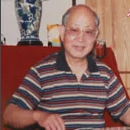Tong Yifeng

Tong Yifeng: Born in Wuyi, Zhejiang in 1923, he is a member of China Musicians Association, China Quyi Artists Association, Beijing Guzheng Research Association, etc. Honorary director of Guzheng Professional Committee of China National Orchestra Society, consultant of Beijing Guzheng Research Association. He used to be the deputy head of the National Orchestra of China National Radio and the deputy head of the Radio Rap Troupe.
Tong Yifeng was born in a mountain valley in Wuyi County, Zhejiang Province in November 1923. Since childhood, the only music Tong Yifeng could hear was the simple sound of the erhu in his father's hands. But he was very interested in it, and also learned to play a few small pieces.
In 1945, Tong Yifeng was admitted to Jiangsu University and studied in the Department of Economics. Since then, he has been able to get in touch with famous local musicians in Xuzhou, including Cao Zheng, a famous guzheng artist. Tong Yifeng and his classmates often interact with them, discussing performance skills, organizing music performances and so on. In 1947, Tong Yifeng officially began to learn Guzheng from Mr. Cao Zheng as a teacher.
In 1949, Tong Yifeng graduated from Jiangsu College. In the following years, he successively went to Taizhou, Yangzhou and other regions as a teacher of the accounting training course of the Northern Jiangsu Cadre School and a teacher of the Jiangsu Provincial Administrative Cadre School. In addition to his own work, Tong Yifeng is often invited by local radio stations to participate in music activities such as recordings and performances.
In 1953, the Central People's Broadcasting Station vigorously searched for performers of various ethnic musical instruments throughout the country in order to establish a radio literary and artistic performance group. At this time, Tong Yifeng also came into their sight because of his proficient knowledge of zheng art. In April 1953, Tong Yifeng was transferred from Yangzhou to Beijing as a guzheng player and secretary of the National Orchestra of the Central People's Broadcasting Station. During the working period, Tong Yifeng often traveled with the orchestra to collect winds all over the country, and successively met Lin Yunbo, a zither master from Chaozhou, Zhao Yuzhai, a master of zheng art from Shandong, Cao Dongfu, a representative of the Henan zheng school, and Guo Ying, a master of Chaozheng. .
From 1953 to 1955, Tong Yifeng produced two guzheng solo records, "The Fishing Boat Sings Evening" and "High Mountains and Flowing Water" for the China Record Club. During about five years from 1953 to 1958, he also recorded the guzheng solo radio tapes "The Fishing Boat Sings Evening", "Water Lotus", "High Mountains and Flowing Water", "Henan Baban" and "Brilliant Flowers" for the Central People's Broadcasting Station. ”, “Dang Yi Song” and more than ten songs, and also used the advanced tool of radio to write and engage in radio literature and art programs for many times, and vigorously introduced and promoted guzheng and zheng music through radio waves.
From 1955 to 1957, he was employed as a part-time teacher of Guzheng by the Central Conservatory of Music. In 1955, Tong Yifeng was invited by the Central Conservatory of Music to teach guzheng at the academy. At that time, the Central Conservatory of Music was in Tianjin, and Tong Yifeng went back and forth between Beijing and Tianjin once a week for two years.
In 1963, Tong Yifeng was appointed as the deputy head of the National Orchestra of China National Radio. In 1972, Tong Yifeng was transferred to the radio rap troupe and served as the deputy head of the troupe.
In order to enrich the repertoire of guzheng, Tong Yifeng has adapted and transplanted many zheng pieces such as "Suwu Shepherd", "Three Layers of Yangguan", "Weaving Net Song", "Gada Merlin" and so on.
In 1985, after retiring, Tong Yifeng devoted all his energy to the popularization of guzheng. He has successively adapted zheng pieces such as "Cai Sang Song" and "Remembering Jiangnan", and is actively engaged in guzheng education. Over the past few decades, more than 100 students at home and abroad have studied zheng art with him. His disciples include kindergarten children, primary and middle school students, middle school teachers, government officials and enterprise employees. He has also cultivated a group of outstanding guzheng players, such as the late zheng player, the president of the Chinese Music Association Guzheng Society, and the professor of the China Conservatory of Music Li Wanfen is his favorite student.
In order to allow more people to understand and learn the art of guzheng, Mr. Tong Yifeng cooperated with student Li Yuanrong to compile the book "Introduction to Guzheng" in 1994, which was published by the People's Music Publishing House in 1995. So far, this guzheng textbook has been sold nationwide and has been printed 21 times, with a total of nearly 140,000 copies.
Similar artist
Involving musical instruments
Involved portfolio
Involved news
Popular artists
- 01 Zhang Xiuyan
- 02 King Hammer
- 03 Deng Jiandong
- 04 A Shicai
- 05 Li Muliang
 渝公网安备 50010702504639号
渝公网安备 50010702504639号